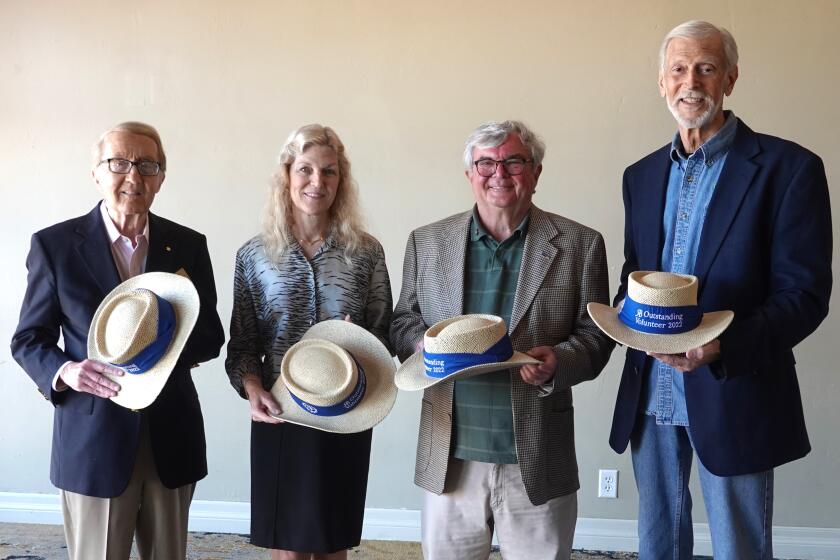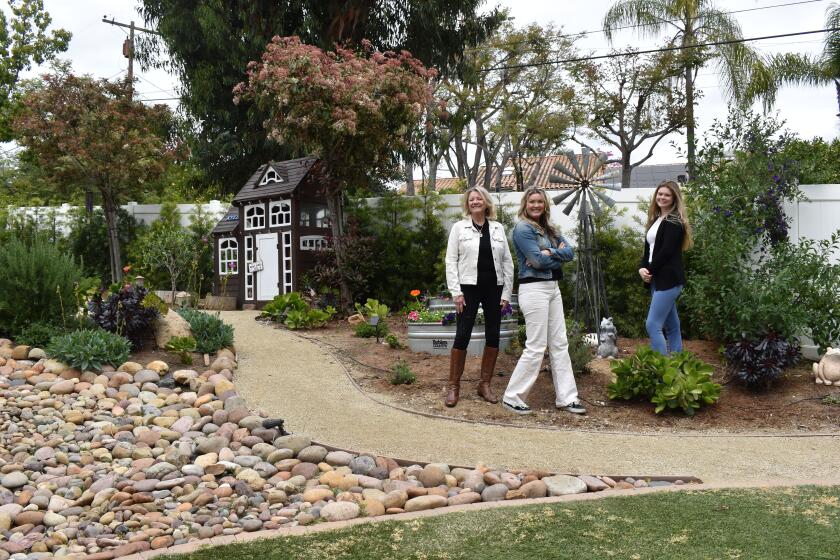District 2 Supervisor race will be a rematch
By Elizabeth Marie Himchak
There will be a rematch in the San Diego County Supervisor District 2 race when the same candidates from 2008 are placed before voters in the June 5 primary.
The district includes Poway.
• Supervisor
Dianne Jacob
is a Republican and Jamul resident. The 72-year-old has lived in the district for 67 years, and she and husband, Paul, have a son. She earned her bachelor’s degree with a life teaching credential from San Diego State University.
She is seeking her sixth four-year term as county supervisor, having held the position for the past 20 years. Prior to this she was a Jamul-Dulzura Union School District board member for 17 years, a California School Boards Association member for 10 years and was its past president, and a San Diego County Planning Commissioner for four years. She does not have a campaign website, but her office site is
.
Jacob said she is seeking a sixth term “for the very same reason I sought the job the first time. I genuinely like helping people. Whether it’s helping one constituent navigate the building department or fighting an unfair tax proposed for thousands of constituents, it’s my mission to see that government works for, not against, the people. That means making the bureaucracy accountable to the people that pay the bills — taxpayers.”
She said the three greatest issues impacting District 2 are public safety, protecting the county’s strong fiscal health and managing regional growth.
To bring change to public safety, including fire protection and keeping neighborhoods safe, Jacob said, “I’ll continue to work with regional fire experts to improve the way we fight fires and eventually create a regional fire entity.” She also said public safety is at risk “because of the dangerous prisoner and parolee shift by the state (so) we have the best team in place that is tackling the shift head on.”
As for fiscal health, Jacob said a balanced budget is key to the county maintaining its strong fiscal health. “The key to our disciplined success — we don’t spend more than we take in.” As for managing regional growth, she said this includes planning communities “in careful, thoughtful, family-centered ways” when dealing with traffic, recreation areas, open space preservation, and building parks and trails.
Jacob said she has seen the Neighborhood Reinvestment Program, in which supervisors currently have $1 million to allocate in the community at their discretion, “greatly improve communities.” Because stricter reporting requirements were needed, Jacob said she initiated reforms a few years back and funding was cut from $2 million to $1 million per district in response to the economy.
She said the county should “absolutely” do more to prevent or fight wildfires and cited progress made to date, including a comprehensive plan that when fully implemented “will be night and day compared to what existed in 2003.” She contrasted the county abandoning rural fire protection in the 1970s to it now spending $15.5 million to keep 50 rural station open daily, adding two new fire fighting helicopters, evacuation plans, and other fire equipment and vehicles.
To improve regional transit, Jacob said “fix the roadways already identified as problematic. We’ve got critical arteries that have been sitting on the improvement list for way too long. Commutes have grown longer because of inattention and failure to prioritize,” and said she “will continue to work with SANDAG to make good on its obligations to already-identified projects.”
To attract businesses, Jacob said the government should not make things more difficult through unnecessary fees, taxes and regulations. She supports the government partnering with the private sector to get jobs done.
Jacob said she would like to keep the Chargers in San Diego but “if the county plays a role (in a City of San Diego-based stadium), it must be a good business deal for taxpayers. That means we receive a return on our investment.”
She said voters should re-elect her because “I promise that each and every day I’ll do my very best to represent the people.”
•
Rudy Reyes
is a Democrat and Santee resident. The 34-year-old has lived in District 2 his entire life, is single and a certified archaeologist with surveyor, excavator and lab specialist credentials. He is also an ordained minister.
He has never held political office, but ran for this position four years ago. His website is
.
Reyes said personal experience inspired his run for the board. “As the worst-injured of the 2003 Cedar fires, I have seen the failure our county has regarding how (the board of supervisors) handles situations. We need new ideologies and updated technological individuals to continue to adapt to the ever technologically changing world. Current county (board members) have been in the same seat for 20 years. Outdated ideas and no comprehension of current technologies, causing a big problem for our county.”
He said the three greatest issues in the district are fire prevention/education, need for more hospitals in the East County and making the county “eco-green.”
For solutions to these, Reyes said Honors Camps used from 1968 to 2003 should be brought back. Through the camps inmates made firebreak roads and cut overgrown brush to prevent fires. Since the board eliminated the program in 2003 he said “we have burned on historic levels every 3-5 year cycles.”
As for hospitals, he said the East County needs more than one. “When I was burned I had to be quickly taken to UCSD in San Diego city to live. Why so far? We need a better system for our citizens to receive medical help.” Regarding his eco-green proposal, he said “with renewable resources becoming more prevalent, our county must at some point start to move toward complete self sufficiency.” This includes, he said, businesses having solar rooftops and homes contributing to the power grid.
As for the Neighborhood Reinvestment Program, Reyes said if used correctly it could be a “huge importance” to communities. “Unforgivably our county supervisors use it as a personal slush fund to get re-elected.” He said the current $5 million distributed annually could be better spent to solve housing shortfalls.
Reyes said the county could do more to prevent or fight wildfires and one step would be to reinstate the Honors Camp program. “Allowing inmates to contribute to society creates pride in one’s community.” He also said doing more controlled burns should be considered and firefighters need to be provided with the required resources.
To improve regional transit, Reyes said “a multi-modal system approach is essential. We need to create a broader transportation system, i.e. bus lanes and more public transit.” He also mentioned safe bike routes between transit points and schools.
When asked about keeping and attracting businesses to the county, he said, “The backbone of San Diego has and always will be tourism. With such a great environment and climate San Diego attracts people. People spend money and that means businesses make jobs. I propose through improvement of the infrastructure of the county we improve quality of life of the residents, tourists and business.”
As for the county contributing to a San Diego city-based football stadium, Reyes said, “in this economy, my answer is no. But I do understand that the county benefits from the tourism of a stadium. So if we need to, limit contributions to the cost of a new stadium in the City of San Diego.”
He said voters should elect him because “I have unique education as to life. I would like to leave a better world for our future generation. Help me serve you. Allow me to bring a new ideology to the county supervisors.” He added, “I am not a politician. I am a regular citizen running to ... repay my community for being there for me in my time of need.”





